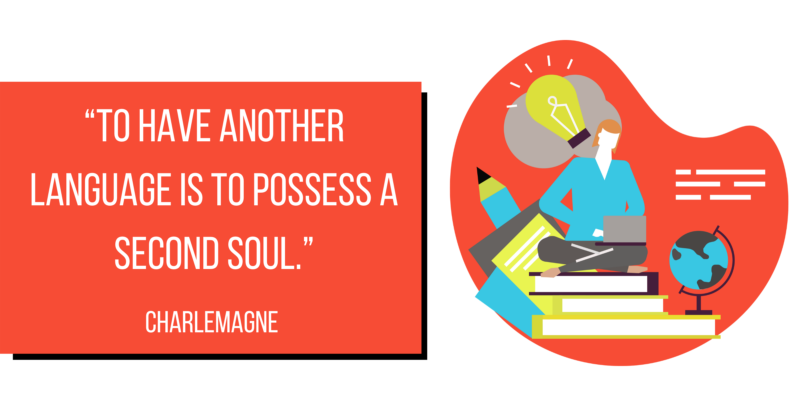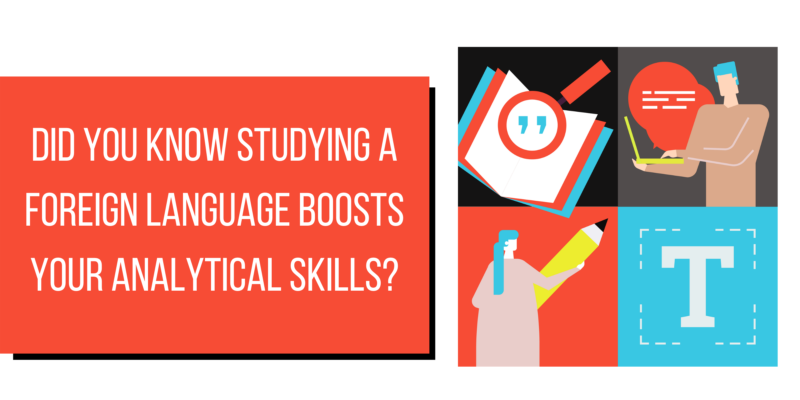Learning another language stimulates your mind, helps you expand the places in the world you can comfortably visit, and can even lead to a variety of jobs in foreign countries. You also could teach your first language or the foreign one you’ve mastered to students near you, or abroad.
Studying another language can help you see from the perspectives of people who have vastly different lives than you. Imagine being able to read a book in the first language of someone who experienced something extraordinary in another country, in another time. No matter how that person’s experiences were described to you in your language by interpreters, after the fact, there’s nothing like hearing it from their native tongue and comprehending all of it.
The same goes for traveling the world. When you have mastered (or at least are competent) in another language, you can navigate places and experience things within them you’d likely miss if you were trapped in translations for an entire trip. The frustration of going somewhere fantastic and not being able to participate because of language deficiencies can be extremely frustrating, and even ruin what would have been an incredible experience.

Fortunately, you have ample opportunities to learn a new language right now. By committing just some time every day to practicing a new language, you can make spectacular leaps and bounds towards fluency. Also, in comparison to other things you might study, you’ll have far more options to choose from in exploring a new language. Whether you opt for an app, training through a website, language software, a free class, one-on-one tutoring, a degree, or some combination of these options, you’ll have time-tested and proven resources that will pay tangible dividends.
There are so many ways to begin learning a foreign language. You can define your goals, but what’s most important is putting some effort in to start. Later on, you can scale this effort up, down, or maintain it over time, depending on your goals, progress, and level of interest.
Let’s dive into some of the different options you can choose from, exploring some of the benefits and drawbacks of each:
Self-Teaching Yourself How to Learn a Foreign Language
One of the most straightforward steps to teaching yourself a foreign language is downloading an app that can prompt you to practice each day. In addition to apps you can study from books designed to help you learn languages, use software, and much more.
You can narrow down your approach by asking yourself and considering the following:
- Have you studied a foreign language before?
- Depending on your experience, you may be able to start a self-training regimen further along than if you’re picking up a new language from scratch. Many of the language apps like Duolingo have you take a test, in the beginning, to assess where to start your study.
- How are you choosing the foreign language you want to study? Is difficulty a factor?
- Many of us take foreign languages in school. You may want to expand on a language you’ve studied, or start a new language from scratch. Some languages have aspects in common, so if you’re looking to learn a new one without a specific goal, you might want to pick one that’s somewhat similar to languages you have experience with. Conversely, if you want a challenge, you might choose a language that’s very different from those you’re familiar with, or speak fluently.
- Are you looking to learn a language for travel, work, or as a stimulating challenge?
- If you need to master another dialect, it makes sense to enter a rigorous program that can push you quickly and get results. However, if you’re looking to learn as a hobby, or to make a trip more enjoyable, you can take a more leisurely pace with your studies.
- Do you have people you can practice speaking a new language with?
- Practicing with others is one of the best ways to learn a new language. It’s engaging, and you have someone to correct you and advise you and feels more like hanging out than studying. If you don’t have a friend you can speak to in your target tongue, you can find one through resources like this one. Conversations are among the most time-effective ways to learn a new tongue.
- What kind of learner are you?
- Some people learn best through reading words off the page, while others are far more auditory learners. Think about how you’re drawn to and retain new information, then construct a learning system around those strengths. It’ll do wonders for your fluency in the longterm.
- Are you looking to live and work in another country, or with people who speak a different language?
- If you know you’ll NEED to speak a foreign language to achieve educational or career goals, you might not want to study on your own. However, if those goals are far in the future, it makes sense to start with self-learning, then supplement it with coursework later.
- How much time can you commit to learning a foreign language?
- If your schedule is packed, apps like Duolingo are an excellent option because they only require a little bit of time each day, and you get results from them. However, the more you practice, the more successful you’ll be. Especially if you want to learn on your own, think hard about how much time you can budget towards studying.
Pros
- You dictate your approach, and the time you commit to it
- Can be completely free
- Completely open-ended method for learning
Cons
- Learning a new language is difficult, and can demand structure
- You might get results quicker from a class
- Your success will depend on your discipline, motivation, and imagination
- You might not know how to study effectively
Not-For-Credit Language Classes
If you want to study a new language, it’s rarely because you want to get college credits in it. Most often, you’re looking to build competence, which will pay dividends throughout your life. There are many classes you can take in the language of your choice, both online and in-person. Some will involve large groups, while others can offer you one-on-one instruction. Some one-on-one instruction is extremely affordable. You can find lessons starting at $10 per hour here. You’ll also be able to choose your instructor from dozens or hundreds of different people.

Consider the following:
- Shop around. There are many different options for language classes. Obviously, some languages are more popular than others, so there’s more options to choose from.
- If you’re going to be learning a new language for work, there’s a chance your company or organization will sponsor some, if not all of the costs of your study.
- Classes with large groups that are spaced out might not be the most effective way to learn a new language. You’ll be spending a lot of time silent, and the class progresses based on how the group is doing overall.
- Think about how you studied a language in school if you took one. Did you retain much of what you learned? Fluency involves intense, consistent practice.
- Learning a new language is extremely personal. Each person learns in different ways, at different paces. Because of this, you might want to consider as much individual and one-on-one study as possible. This could make a class with a group ineffective and not worth the time or money it takes.
You might also consider pursuing a MOOC. MOOCs are Massive Open Online Courses. They are often free. You can find MOOCs in most languages you’d be interested in studying, or in a more general area that covers the nature of language, like linguistics.
Pros
- Structured learning environment
- Can be inexpensive
- Options for individual and group learning
- Can be supplemented with other study
Cons
- May not be as effective as personalized study
- Need to pay for most classes or instruction
- Might not produce results commensurate with what you’re paying
Foreign Language Degrees and Certifications
If you want, you can study a foreign language in a disciplined degree program. Unlike one-off courses, you’ll take many different classes that help you learn a language. You’ll supplement courses on the language itself by studying other aspects of history, culture, and much more. Some of the options you can choose from include:
- Certificate for teaching English or a Foreign Language
- Associates in a Foreign Language
- Bachelors in a Foreign Language
- Masters in a Foreign Language
- Doctorates in a Foreign Language
Some of these degrees can be taken online.
Here at Degree Query we’ve done lots of work to help you decide what degree is best for you and to answer common questions about education and careers. Some of the work we’ve done related to language study and related disciplines can be found below:
- What Can I Do with a Degree in German?
- What Can I Do with a Degree in Spanish?
- What Can I Do With an Italian Degree?
- What Can I Do With a Middle Eastern & African Studies Degree?
- What Can I Do with a Degree in South Asian Studies?
- What Can I Do With a Latin American Studies Degree?
- What Can I Do with a Degree in Speech, Language, and Hearing Sciences?
- What Can I Do With a Russian & East European Languages Degree?
- How Do I Become A Teacher of a Foreign Language If I’m Not a Native Speaker in That Language?
- Do I Need to Be Able to Speak Both Languages in a Bilingual School?
- What Can I Do With a French Degree?
- What Can I Do With a Degree in East and South Asian Studies?
- What Can I Do With a Linguistics Degree?
